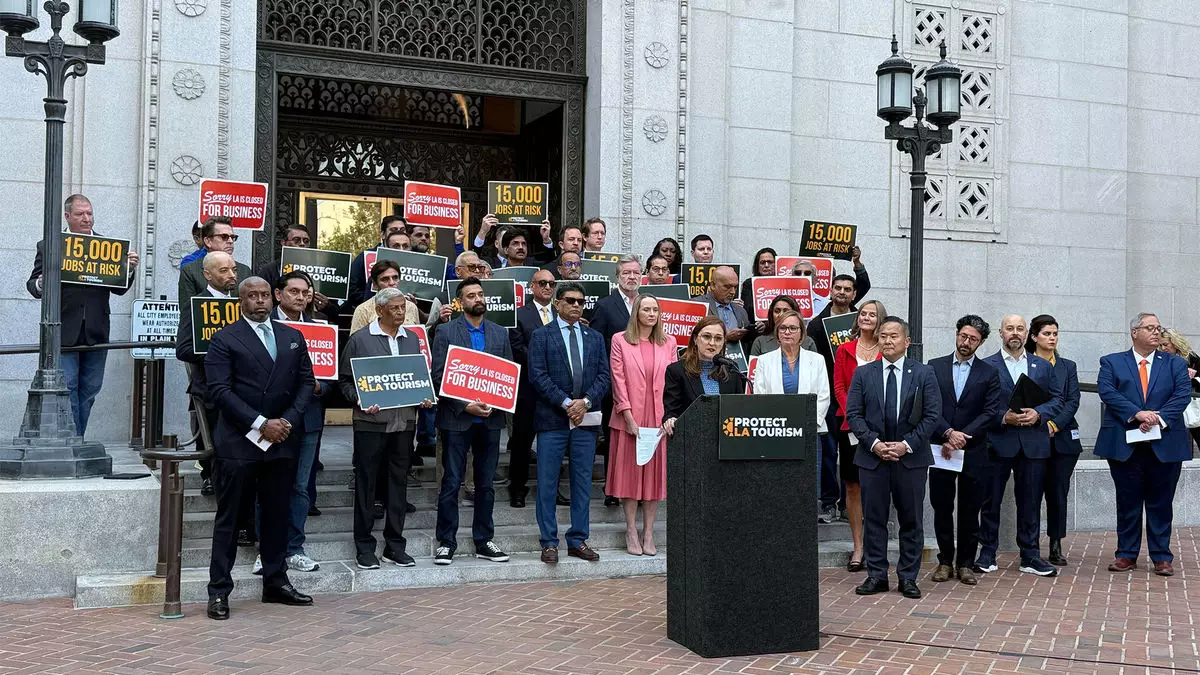Los Angeles, a city synonymous with glitz and glamour, is currently embroiled in a heated debate surrounding a proposed $30 minimum wage for its tourism workers. This odyssey for fair wages is not just a labor issue; it embodies the complex interplay between economic recovery and social equity in a post-pandemic landscape. As the city grapples with the aftermath of a disastrous wildfire season and the lingering effects of COVID-19, this contentious proposal—dubbed the „Olympic Wage Ordinance“—challenges the very foundation of Los Angeles’ tourism economy.
The ordinance aims to incrementally elevate wages for employees in the hospitality sector, particularly those working in hotels with over 60 rooms and airport facilities, reaching the ambitious target of $30 per hour by 2028, just in time for the upcoming Los Angeles Olympics. Critics of the proposal argue that such an increase could severely hamper an industry still licking its wounds from recent disasters, warning it may lead to drastic job losses and deter future investments in hotels.
Concerns from Industry Leaders
Traci Park, a member of the Los Angeles City Council, raised alarms over the potential fallout from the wage hike. According to her assessment, the implementation of such a higher wage could escalate operating costs by almost 69% within a mere two months. According to a report from the American Hotel & Lodging Association (AHLA), the proposal, if passed, could eliminate approximately 14,000 jobs in the hotel sector alone, costing local and state governments around $169 million in lost tax revenues.
This chilling prediction is underscored by the findings of various stakeholders, including the Chamber of Commerce, that argue a higher minimum wage could stifle growth in an industry that is already recovering at a sluggish pace. The narrative of economic struggle is compounded by the various interruptions from natural disasters and the lingering repercussions of international travel bans amid the pandemic. The developers of significant projects, such as the Hilton Los Angeles/Universal City, threaten to abandon ventures if the wage increase becomes law, illustrating a real and present danger to both job creation and economic growth.
A Counterargument for Change
However, labor organizations present a markedly different perspective. Supporters of the wage increase emphasize the pressing need for economic equity in an era when housing affordability looms large in the minds of Angelenos. Advocacy groups like Unite Here Local 11 argue that adequate wages are essential for workers to remain housed in Los Angeles‘ expensive real estate market. Kurt Petersen, co-president of the union, asserts that raising wages not only sustains families but also fortifies the local economy—contradicting the narrative that wages should be sacrificed at the altar of corporate profit.
The potential for the Olympic and Paralympic Games to bolster local tourism serves as a critical backdrop for this discussion. With upcoming major sports events, proponents argue that investing in fair wages ensures tourism workers share in the prosperity generated by such global spectacles. As articulated by industry leaders, the influx of tourism anticipated over the next few years could create a pivotal turning point—not just for job recovery—but for the very fabric of Los Angeles’ working class.
The Ongoing Struggle for Fair Wages
As the conversation unfolds, Los Angeles is gradually recovering from an impasse characterized by low international visitor numbers, exacerbated by recent trends indicating a decrease in air travel. The city witnessed a stark 11.6% drop in overseas visitation in March, which only compounds the challenges facing tourism stakeholders. This precarious state of affairs enhances the urgency for stable employment opportunities, particularly in an industry as susceptible to fluctuations as hospitality.
Despite the sobering statistics regarding economic recovery, certain operators are expressing cautious optimism. Leaders like Tom Kiely from Visit West Hollywood are hopeful, noting an uptick in bookings and a resurgence of traffic into city venues. Yet, skepticism remains high as the tourism industry confronts the reality of rising operational costs amidst an unstable recovery.
Los Angeles finds itself at a crossroads where the decision on the minimum wage proposal could shape the future of its tourism industry and the livelihoods of its workers. The community’s response to this ordinance underscores broader societal values regarding labor rights, economic growth, and social equity. As stakeholders prepare for the forthcoming Economic Development and Jobs Committee hearing, all eyes are on how this debate will unfold—perhaps revealing whether the city will prioritize corporate interests or affirm its commitment to the workers that sustain its vibrant tourism economy.


Napsat komentář